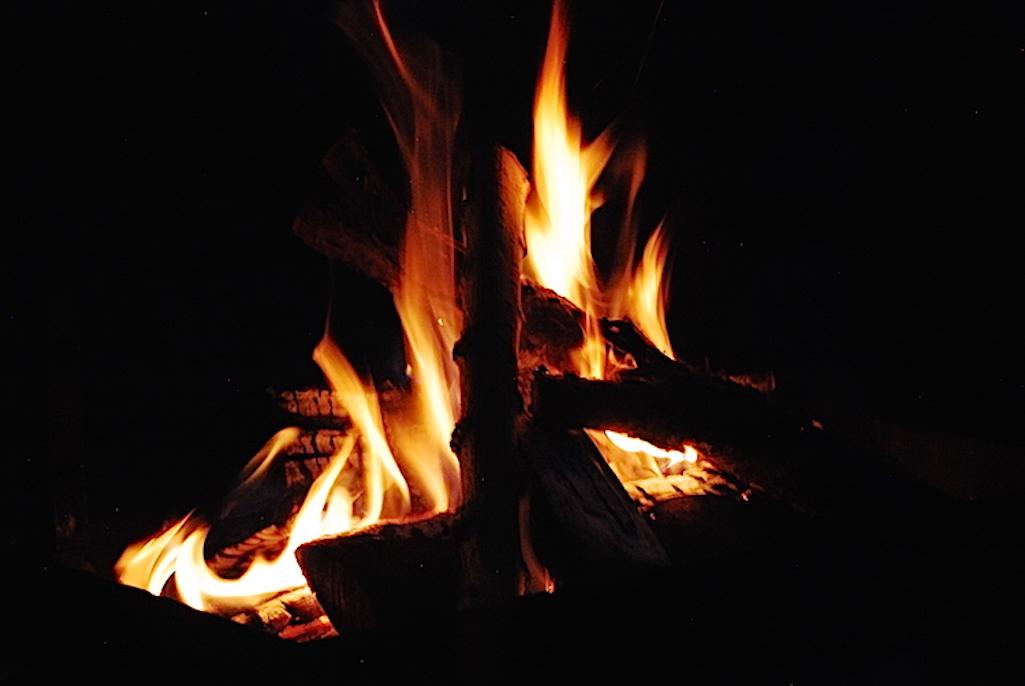
Nice campfire, but how good is its smoke for you?/Kurt Repanshek file
Campfires have been part of camping in the National Park System forever, most likely. There certainly were campfires in the area we now know as Yellowstone National Park before it was a park. But is the smoke from campfires good for you?
Smoke from one small campfire probably isn't terrible for you, unless you sit immediately downwind of the flames. But, what about those campgrounds with dozens and dozens of campsites, each one with its own fire ring?
During a recent stay at the Fruita Campground in Capitol Reef National Park many of those fire rings got used. When the sun went down, the dancing flames, and their choking smoke, went up. For the next five or six hours the smoke swirled and blew and at times downright stunk (especially when people doused the flames with water; a good thing, but the smell is not so good.)
Being directly downwind of two of those campsites with campfires, we ate, smelled, and suffered through a lot of smoke during our two nights there. Not fun. And when the winds kicked up with gusts that seemed to reach 25-35 mph, I worried about flying sparks melting holes in our tent, or even setting a real wildfire.
Recently there have been stories in the news about the pollutants carried in the smoke from last year's wildfires in the West. One just came out last week from the University of California at Berkeley, and said:
Wildfire smoke can trigger a host of respiratory and cardiovascular symptoms, ranging from a runny nose and cough to a potentially life-threatening heart attack or stroke. A new study suggests that the dangers posed by wildfire smoke may also extend to the largest organ in the human body and our first line of defense against outside threat: the skin.
“Existing research on air pollution and health outcomes has focused primarily on cardiac and respiratory health outcomes, and understandably so. But there is a gap in the research connecting air pollution and skin health,” said study lead author Raj Fadadu, a student in the UC Berkeley-UCSF Joint Medical Program. “Skin is the largest organ of the human body, and it’s in constant interaction with the external environment. So, it makes sense that changes in the external environment, such as increases or decreases in air pollution, could affect our skin health.”
Other studies have pointed out the bad health effects wood smoke causes on youngsters' respiratory systems, raised questions about the health impacts of bacteria and fungi carried into the air smoke from fires, and claimed wood smoke is worse for you than your car's exhaust.
Now, imagine if your lungs are comprised for some reason, or you have heart issues, or both. Do you pitch your tent or park your RV in a campground where you might fall to sleep with dozens, or possibly more than 100, campfires flickering outside your thin tent walls or RV? Sure, it's not like a 10,000-acre wildfire bellowing smoke, but at times the campground smoke can hover in place.
We're searching for specific studies on the health effects of campground campfire smoke and will relay them if we find any, but in the meantime, what do you think about campfire smoke in national park campgrounds.



Comments
I'm a professional recreationist. I taught camping at Chico State to city slickers back in my day. I've been a camper my entire lifetim. Begining when I was a little Kid. I was a Boy Scout. i still go camping with friends these days. Butt, it so different now. They all have huge camping trailers and always stay in improved campgrounds. It's totally different from wilderness camping. Teaching city people how to build a proper campfire is challenging. They always end up making a bond fire. That's the kind of fires you seem to be describing. And I totally dislike. Those should be prohibited my the camp host and policed by the rangers.
Love campfires. Yes the smoke is irritating sometimes but it's peoples dogs that get to me more. Is it a requirement to have a dog when camping and using RV,s?
Do you bring a dog ? If so you are disqualified
I am actually surprised by this all. The rugged image of American individual self reliance and adventure seekers is dying to be replaced by woke people who are overly aware cautious and scared of everything. Even a little campfire now.
I used to volunteer at Capitol Reef and the smoke from wood fired was bad nearly every evening.say no to wood fires at all National parks.
Growing up, I learned to sit so the campfire smoke blew in my face, to keep the bugs away.
My family and I have spent many wonderful hours camping in many different states. We have often been inundated with campfire smoke. The beautiful and relaxing environment is immediately ruined. And to top it off your clothing and hair are penetrated with a heavy unpleasant odor. Let us not forget the danger of forest fires.
Campfire smoke is a real problem. Too many people are so unaware of anything other than themselves that they just don't care about the people around them. I've been in campgrounds where I couldn't sleep because of the smoke. It's time for fresh air and quiet camping in the National Parks.